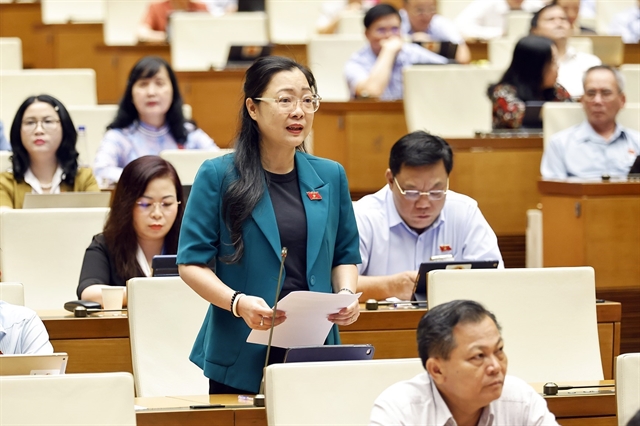 Politics & Law
Politics & Law


|
| Deputy Nguyễn Thị Quyên Thanh from the southern province of Vĩnh Long gives her opinion at the session. — VNA/VNS Photo Doãn Tấn |
HÀ NỘI — National Assembly (NA) deputies on Wednesday morning expressed appreciation for the instruction and determination of the Politburo, the Government and the NA while discussing the nation's socio-economic development plan and State budget last year and at present.
They confirmed that many recently passed resolutions are a positive signal showing synchronisation from the central to the local level and from the planning stage to implementation.
Deputy Nguyễn Thị Quyên Thanh from the southern province of Vĩnh Long said that the Politburo had a number of important resolutions, such as Resolution 57-NQ/TW on breakthroughs in science and technology development, innovation and national digital transformation; Resolution 59-NQ/TW on international integration in the new era; Resolution 66-NQ/TW on innovation in law-making and enforcement to meet the requirements for national development; and Resolution 68-NQ/TW on developing the private economy.
The Government is also actively advising the Politburo and the Secretariat about resolutions on education and health.
All of the work showed a very strong, comprehensive and consistent reform direction, which was highly appreciated and agreed upon by the people, she said.
Thanh said that Resolution 68-NQ/TW is a revolution in thinking and a major milestone, adding that it would increase momentum for the private economy to rise up and become a pillar for the national economy.
Under the resolution, developing domestic enterprises would help create a strong business community with many enterprises capable of competing internationally and realising the country's goals in the new era.
At the same time, more and more products are competitive enough to replace imported goods, enhancing new products based on scientific and technological innovation and digital transformation.
She proposed strengthening the enforcement monitoring mechanism, establishing a separate feedback channel for the business community when encountering difficulties and problems, providing specific instructions and clearly defining boundaries for easy applications.
Infrastructure
Deputy Thanh said that improving transport infrastructure is a major breakthrough.
"If transport infrastructure did not receive timely and adequate investment, we could not have achieved the results we have today. Most recently, we have inaugurated more than 80 key national projects with a total capital of nearly US$15 billion. However, the most important thing is not the number of projects and investment capital, but the new way of doing things with the consensus and confidence of the whole nation," said Thanh.
She pointed out that merging provincial-level administrative units was an important step in the administrative reform process to build a streamlined, effective and efficient State apparatus, creating a diverse growth space.
However, the merging process not only brings benefits, but also poses many challenges in operating and managing large areas.
In addition to solidarity, unity, strong political determination, dynamism and creativity, and to maintain socio-political stability, Thanh suggested that the Government should pay attention to specific infrastructure requirements.
The country should create mechanisms and policies for investment in transport and agricultural infrastructure, workforce training, creating an attractive investment environment and greater attraction for businesses to invest sustainably.
Innovation and organising production for the global supply chain should also comply with market rules, minimise raw materials exports in favour of higher value-added goods, form agricultural product consumption channels, enhance e-commerce for sustainable supply chains and apply traceability to meet domestic and international needs.
Thanh also proposed adjusting plans for development to build modern, integrated infrastructure, including transport, telecommunications, urban and industrial infrastructure, effectively connecting with provinces in the region and forming a united infrastructure network for the whole country.
Deputy Đào Chí Nghĩa from the southern city of Cần Thơ said that from 2021 until now, the country's transport infrastructure has created breakthroughs, as vital projects have been completed and put into operation.
The Government and the Prime Minister have called for the upgrade of key national transport infrastructure projects, including the North-South expressway and expressways passing through provinces and cities in the Mekong Delta and in the northwest region, increasing the total length of current expressways to 2,268km.
Nghĩa said that promoting infrastructure investment, innovation and streamlining will create an important foundation to promote the country's rise in the next few years.
Pointing out difficulties and challenges faced in the Mekong Delta region, Nghĩa expressed the hope that the Government, ministries and sectors will increase investment for the region to boost economic development in the area, especially in transport infrastructure.
Aside from the expressway system currently under construction, the Government should also develop inland waterways and railways connecting HCM City with Cần Thơ, speed up the dredging of Định An and Hậu River channels and build the Trần Đề seaport to create a smooth connection from the Mekong Delta to HCM City and the southeastern provinces, opening up opportunities for trade connections with the region and the world. — VNS




